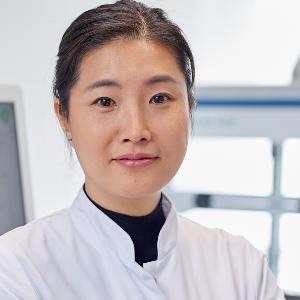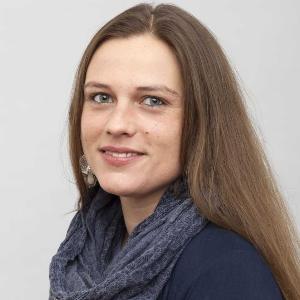Human genetics and Islamic art history: two new ERC grants at LMU
22 Nov 2022
Two early-career scholars have each been awarded a Starting Grant with LMU by the European Research Council (ERC) – one of the most prestigious research awards in Europe.
22 Nov 2022
Two early-career scholars have each been awarded a Starting Grant with LMU by the European Research Council (ERC) – one of the most prestigious research awards in Europe.
Two early-career scholars at LMU have each been awarded a Starting Grant by the European Research Council (ERC) for their research. Human geneticist Sarah Kim-Hellmuth and Ilse Sturkenboom, Professor of Islamic Art History, will each receive project funding of 1.5 million euros. ERC Grants are awarded on the basis of the scientific excellence of the applicants and of the proposals and are among the most prestigious research awards in Europe.

© Stephan Höck / LMU
Sarah Kim-Hellmuth is a consultant doctor specialized in human genetics. She is an independent group leader of an Emmy Noether Research Group at the Dr. von Hauner Children’s Hospital, LMU and at the Institute of Translational Genomics, Helmholtz Munich. Her group studies the genetic influence on the human immune system.
Some people are knocked flat by every cold, while others make it through the winter without ever feeling ill. Some develop an autoimmune disease; others do not. Moreover, the same condition can have very different symptoms and courses. How well the immune system protects against viruses, and how robust it is against autoimmune diseases, thus varies greatly from person to person. Despite intensive research, scientists have not yet been able to fully explain why this is. Sarah Kim-Hellmuth has long investigated such individual variabilities of gene expression for different organs.
In her new project ImmGenDC (Dissecting the context-specificity of genetic immune regulation in plasmacytoid dendritic cells), which has been awarded ERC funding, she plans to investigate the genetic regulation of the immune system by focusing on a particular cell type. So-called plasmacytoid dendritic cells (pDC) are important players in the immune system. These cells respond to many different pathogens and exhibit a previously underestimated functional diversity.
For Sarah Kim-Hellmuth, there are strong indications that genetic regulation of pDC has a fundamental influence on antiviral response and on autoimmune variability. In her earlier research, the human geneticist has already been able to demonstrate that genetic regulation of gene expression is largely context-specific and depends on cell type, cell response, genetic populations, and sex, among other factors. The overarching goal of the project is to shed light on the context-specificity of immune response and its genetic regulation in pDC to better understand the variation of human antiviral response and reveal undiscovered mechanisms of autoimmune diseases.
To this end, Kim-Hellmuth is planning to carry out sophisticated computational analyses and comparisons of genetic data to identify new pDC subtypes and their genetically regulated immunoregulatory circuits. With these results she will create predictive models of immune responsiveness and decipher gene loci that are connected to autoimmune diseases. If successful, this will open the door to the development of novel interventions in precision medicine.
Dr. Sarah Kim-Hellmuth studied human medicine at LMU and the Technical University of Munich. She was a resident physician at the Institute of Human Genetics at University Hospital Bonn. After that, she performed her postdoctoral training at the New York Genome Center and at Columbia University, New York, where she was lead analyst at the Genotype-Tissue Expression (GTEx) Consortium, before returning to Munich in 2020.

© privat
Ilse Sturkenboom is Professor of Islamic Art History at LMU. The art historian is particularly interested in Islamicate arts of the book and the exchange between Islamicate art and other cultures.
For a long period, manuscripts were the only place in the Islamicate world where you could find painting. In her ERC project GLOBAL DECO PAPER (Decorated Paper in the Early-Modern Islamicate World: Aesthetics, Techniques and Meaning in Global Contexts), Ilse Sturkenboom is seeking to understand the early-modern history of Islamicate arts of the book from a perspective that has thus far not been considered: the border and background decoration of manuscripts. The manifold forms of paper decoration and their techniques have hitherto not been systematically analyzed by historians of Islamic Art, who instead have focused on manuscripts’ figurative illustrations. For a full comprehension of art and the exploration of global artistic contacts between different cultures, however, the decorative devices also play a role that should not be neglected.
In her project, Sturkenboom is pursuing an interdisciplinary approach, in which scholars from humanities and natural sciences collaborate to research artistic and technical aspects of decorated paper – primarily from collections in the Middle East and Asia – produced in early-modern China, Central Asia, Iran, India, and the Ottoman Empire. In this way, the researchers want to shed new light in particular on networks of trade, diplomacy, and artistic exchange in Asia and the Middle East that paved the way for greatly varied and technically advanced forms of augmented paper decoration.
Ilse Sturkenboom studied “Art History” and “Art History and Archaeology” at the University of Groningen. After that, she did a course in Iranian Studies at the University of Bamberg, where she also competed a doctorate. Following stints at the Metropolitan Museum of Art in New York, the University of Amsterdam, and the University of Vienna, she took up a role as Lecturer in Iranian Islamic Art History at the University of St Andrews in Scotland in 2016. Ilse Sturkenboom joined the staff of LMU in 2021 as Professor of Islamic Art History.